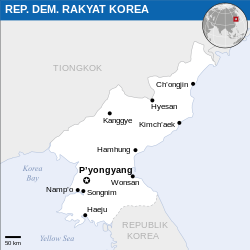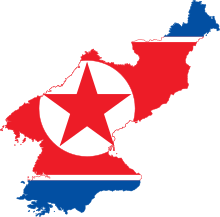
Back Аҩадатәи Кореиа Abkhazian Korèa Utara ACE Noord-Korea Afrikaans Nordkorea ALS ስሜን ኮርያ Amharic Korea, north AMI Corea d'o Norte AN Norþcorea ANG उत्तर कोरिया ANP كوريا الشمالية Arabic
Republik Rakyat Demokratik Korea 조선민주주의인민공화국 Chosŏn Minjujuŭi Inmin Konghwaguk (Korea) | |
|---|---|
Wilayah yang dikuasai Korea Utara berwarna hijau tua; wilayah yang diklaim tetapi tidak dikuasai berwarna hijau muda. | |
 | |
| Status | Negara berdaulat |
| Ibu kota | Pyongyang 39°2′N 125°45′E / 39.033°N 125.750°E |
| Bahasa resmi | Korea[1] |
| Aksara resmi | Chosŏn'gŭl[2] |
| Agama (2020) |
|
| Pemerintahan | Kesatuan Juche Songun satu partai kediktatoran totaliter republik konstitusional[3] |
| Kim Jong-un[n 1] | |
| Choe Ryong-hae | |
| Kim Tok-hun | |
| Legislatif | 최고인민회의 Ch’oego Inmin Hoeŭi |
| Pembentukan | |
| c. abad ke-7 SM | |
| 18 SM | |
| 698 | |
| 918 | |
| 1392 | |
| 12 Oktober 1897 | |
| 29 Agustus 1910 | |
| 1 Maret 1919 | |
| 11 April 1919 | |
• Kemerdekaan dari Jepang | 15 Agustus 1945 |
• Pembentukan Komite Rakyat Sementara Korea Utara | 8 Februari 1946 |
• Pembentukan RRDK | 9 September 1948 |
• Penerapan ideologi Juche | 27 Desember 1972 |
• Bergabung dengan PBB | 17 September 1991 |
• Konstitusi saat ini | 29 Juni 2016 |
| Luas | |
- Total | 120.540 km2[4] (ke-97) |
| 0,11 | |
| Penduduk | |
- Perkiraan 2022 | 25.955.138[5] (55) |
- Sensus Penduduk 2008 | 24.052.231[6] |
| 212/km2 (65) | |
| PDB (KKB) | 2015 |
- Total | $40 miliar[7] |
| $1.800[8] | |
| PDB (nominal) | 2019 |
- Total | $16 miliar[9] |
| $640 | |
| IPM (1995) | 0,766[10][11] tinggi |
| Mata uang | Won Rakyat Korea (₩) ( KPW) |
| Zona waktu | Waktu Pyongyang[12] (UTC+9) |
| Format tanggal | |
| Lajur kemudi | kanan |
| Kode telepon | +850[13] |
| Kode ISO 3166 | KP |
| Ranah Internet | .kp[14] |
Situs web resmi www | |
| Republik Rakyat Demokratik Korea | |
 "Republik Rakyat Demokratik Korea" dalam aksara chosŏn'gŭl (atas) dan hancha (bawah). | |
| Nama Korea | |
|---|---|
| Josŏn-gŭl | |
| Hanja | |
| Alih Aksara | Joseon Minjujuui Inmin Gonghwaguk |
| McCune–Reischauer | Chosŏn Minjujuŭi Inmin Konghwaguk |
Korea Utara, secara resmi bernama Republik Rakyat Demokratik Korea (Hangul: 조선민주주의인민공화국; Hanja: 朝鮮民主義人民共和國; MR: Chosŏn Minjujuŭi Inmin Konghwaguk), adalah sebuah negara di Asia Timur, yang meliputi bagian utara Semenanjung Korea. Ibu kota dan kota terbesarnya adalah Pyongyang. Zona Demiliterisasi Korea menjadi batas antara Korea Utara dan Korea Selatan. Sungai Amnok dan Sungai Tumen membentuk perbatasan antara Korea Utara dan Tiongkok. Sebagian dari Sungai Tumen di timur laut merupakan perbatasan dengan Rusia. Penduduk setempat menyebut negaranya Pukchosŏn (북조선, "Chosŏn Utara"), sementara penduduk Korea Selatan menyebutnya sebagai Bukhan (북한, "Han Utara")
Semenanjung Korea diperintah oleh Kekaisaran Korea hingga dianeksasi oleh Jepang setelah Perang Rusia-Jepang tahun 1905. Setelah kekalahan Jepang pada Perang Dunia II, Korea dibagi menjadi wilayah pendudukan Uni Soviet dan Amerika Serikat. Korea Utara menolak ikut serta dalam pemilihan umum yang diawasi PBB yang diselenggarakan di selatan pada 1948, yang mengarah kepada pembentukan dua pemerintahan Korea yang terpisah oleh zona demiliterisasi. Baik Korea Utara maupun Selatan mengklaim kedaulatan di atas seluruh semenanjung, yang berujung kepada Perang Korea tahun 1950. Sebuah gencatan senjata pada 1953 mengakhiri pertempuran; namun kedua negara secara resmi masih berada dalam status perang, karena perjanjian perdamaian tidak pernah ditandatangani.[15] Kedua negara diterima menjadi anggota Perserikatan Bangsa-Bangsa pada 1991.[16] Pada 26 Mei 2009, Korea Utara secara sepihak menarik diri dari gencatan senjata.[17]
Korea Utara termasuk dalam negara satu-partai di bawah front penyatuan yang dipimpin oleh Partai Buruh Korea.[18][19][20][21] Pemerintahan negara mengikuti ideologi Juche, yang digagas oleh Kim Il-sung, mantan pemimpin negara ini. Juche menjadi ideologi resmi negara ketika negara ini mengadopsi konstitusi baru pada 1972,[22] kendati Kim Il-sung telah menggunakannya untuk membentuk kebijakan sejak sekurang-kurangnya awal tahun 1955.[23] Sementara resminya sebagai republik sosialis atau negara komunis, Korea Utara dipandang oleh sebagian besar negara sebagai negara kediktatoran totaliter berpaham Stalinis.[19][20][24][25][26] Setelah kematian Kim Jong-il pada tanggal 19 Desember 2011, pemimpin Korea Utara berikutnya adalah Kim Jong-un, anak termuda Kim Jong-il.
- ^ Minahan, James B. (2014). Ethnic Groups of North, East, and Central Asia: An Encyclopedia. Santa Barbara: ABC-CLIO. hlm. 147. ISBN 978-1-61069-018-8.
- ^ Alton, David; Chidley, Rob (2013). Building Bridges: Is There Hope for North Korea?. Oxford: Lion Books. hlm. 89. ISBN 978-0-7459-5598-8.
- ^ "Korea, North". Britannica Book of the Year 2014. London: Encyclopedia Britannica, Inc. 2014. hlm. 642. ISBN 978-1-62513-171-3.
- ^ Kesalahan pengutipan: Tag
<ref>tidak sah; tidak ditemukan teks untuk ref bernamaunstats08 - ^ "Explore all countries–North Korea". World Fact Book. Diakses tanggal 24 Oktober 2022.
- ^ "DPR Korea 2008 Population Census National Report" (PDF). Pyongyang: DPRK Central Bureau of Statistics. 2009. hlm. 14. Diarsipkan dari versi asli (PDF) tanggal 31 March 2010. Diakses tanggal 19 February 2011.
- ^ Kesalahan pengutipan: Tag
<ref>tidak sah; tidak ditemukan teks untuk ref bernamaCIAGDP(PPP) - ^ Kesalahan pengutipan: Tag
<ref>tidak sah; tidak ditemukan teks untuk ref bernamaCIAGDP(PPP)Capita - ^ "UNData app".
- ^ "Table 1.3 : HDI ranking for developing countries, 1995" (PDF). Human Development Report 1998. United Nations Development Program. 1998. hlm. 33. Diakses tanggal 23 April 2016.
- ^ "Table 1.3 : HDI ranking for developing countries, 1994" (PDF). Human Development Report 1997. United Nations Development Program. 1997. hlm. 45. Diakses tanggal 12 October 2016.
- ^ "Decree on Redesignating Pyongyang Time". Naenara. 30 April 2018. Diakses tanggal 4 May 2018.
- ^ Kesalahan pengutipan: Tag
<ref>tidak sah; tidak ditemukan teks untuk ref bernamaCIATelephone - ^ Kesalahan pengutipan: Tag
<ref>tidak sah; tidak ditemukan teks untuk ref bernamaHersher2016 - ^ "U.S.: N. Korea Boosting Guerrilla War Capabilities". FOX News Network, LLC. 2009-06-23. Diarsipkan dari versi asli tanggal 2009-06-27. Diakses tanggal 2009-07-04.
- ^ Sanger, David E. (1991-05-29). "North Korea Reluctantly Seeks U.N. Seat". The New York Times Company. Diarsipkan dari versi asli tanggal 2011-05-11. Diakses tanggal 2009-07-04.
- ^ Jeong, Jae Sung (2009-05-27). "KCNA: Korean Peninsula in State of War". The Daily NK. The Daily NK. Diarsipkan dari versi asli tanggal 2009-06-30. Diakses tanggal 2009-07-04.
- ^ Spencer, Richard (2007-08-28). "North Korea power struggle looms". The Telegraph (online version of UK national newspaper). London. Diarsipkan dari versi asli tanggal 2008-02-27. Diakses tanggal 2007-10-31.
A power struggle to succeed Kim Jong-il as leader of North Korea's Stalinist dictatorship may be looming after his eldest son was reported to have returned from semi-voluntary exile.
Parry, Richard Lloyd (2007-09-05). "North Korea's nuclear 'deal' leaves Japan feeling nervous". The Times (online version of UK's national newspaper of record). London. Diarsipkan dari versi asli tanggal 2008-07-26. Diakses tanggal 2007-10-31.The US Government contradicted earlier North Korean claims that it had agreed to remove the Stalinist dictatorship’s designation as a terrorist state and to lift economic sanctions, as part of talks aimed at disarming Pyongyang of its nuclear weapons.
Walsh, Lynn (2003-02-08). "The Korean crisis". CWI online: Socialism Today, February 2003 edition, journal of the Socialist Party, CWI England and Wales. socialistworld.net, website of the committee for a worker’s international. Diarsipkan dari versi asli tanggal 2007-12-03. Diakses tanggal 2007-10-31.Kim Jong-il's regime needs economic concessions to avoid collapse, and just as crucially needs an end to the strategic siege imposed by the US since the end of the Korean war (1950–53). Pyongyang's nuclear brinkmanship, though potentially dangerous, is driven by fear rather than by militaristic ambition. The rotten Stalinist dictatorship faces the prospect of an implosion. Since the collapse of the Soviet Union, which deprived North Korea of vital economic support, the regime has consistently attempted to secure from the US a non-aggression pact, recognition of its sovereignty, and economic assistance. The US's equally consistent refusal to enter into direct negotiations with North Korea, effectively ruling out a peace treaty to formally close the 1950–53 Korean war, has encouraged the regime to resort to nuclear blackmail.
Oakley, Corey (2006). "US is threat to peace not North Korea". Edition 109 - October–November 2006. Socialist Alternative website in Australia. Diarsipkan dari versi asli tanggal 2010-12-23. Diakses tanggal 2007-10-31.In this context, the constant attempts by the Western press to paint Kim Jong-il as simply a raving lunatic look, well, mad. There is no denying that the regime he presides over is a nasty Stalinist dictatorship that brutally oppresses its own population. But in the face of constant threats from the US, Pyongyang's actions have a definite rationality from the regime's point of view.
- ^ a b Brooke, James (2003-10-02). "North Korea Says It Is Using Plutonium to Make A-Bombs". The New York Times. Diarsipkan dari versi asli tanggal 2016-09-05. Diakses tanggal 2007-10-31.
North Korea, run by a Stalinist dictatorship for almost six decades, is largely closed to foreign reporters and it is impossible to independently check today's claims.
- ^ a b Baruma, Ian. "Leader Article: Let The Music Play On". The Times of India. Diarsipkan dari versi asli tanggal 2019-04-25. Diakses tanggal 2008-03-27.
North Korea, officially known as the Democratic People's Republic of Korea, is one of the world's most oppressive, closed, and vicious dictatorships. It is perhaps the last living example of pure totalitarianism - control of the state over every aspect of human life.
- ^ Finn, Peter (2009-06-08). "U.S. to Weigh Returning North Korea to Terror List". Washington Post. Diarsipkan dari versi asli tanggal 2009-06-07. Diakses tanggal 2009-06-19.
The Bush administration removed North Korea from the list of terrorist states last year as part of an unfulfilled commitment by the dictatorship to dismantle its nuclear weapons program.
- ^ "Constitution of North Korea (1972)". 1972. Diarsipkan dari versi asli tanggal 2010-06-11. Diakses tanggal 2009-05-07.
- ^ Martin, Bradley K. (2004). Under the Loving Care of the Fatherly Leader: North Korea and the Kim Dynasty. New York, NY: Thomas Dunne Books. hlm. 111. ISBN 0-312-32322-0.
Although it was in that 1955 speech that Kim gave full voice to his arguments for juche, he had been talking along similar lines as early as 1948.
- ^ "Freedom in the World, 2006". Freedom House. Diarsipkan dari versi asli tanggal 2007-07-14. Diakses tanggal 2007-02-13.
Citizens of North Korea cannot change their government democratically. North Korea is a totalitarian dictatorship and one of the most restrictive countries in the world.
- ^ "Economist Intelligence Unit democracy index 2006" (PDF). Economist Intelligence Unit. 2007. Diarsipkan (PDF) dari versi asli tanggal 2016-04-13. Diakses tanggal 2007-10-09. North Korea ranked in last place (167, lower is better)
- ^ "A portrait of North Korea's new rich". The Economist. 2008-05-29. Diarsipkan dari versi asli tanggal 2008-08-02. Diakses tanggal 2009-06-18.
EVERY developing country worth its salt has a bustling middle class that is transforming the country and thrilling the markets. So does Stalinist North Korea.
Kesalahan pengutipan: Ditemukan tag <ref> untuk kelompok bernama "lower-alpha", tapi tidak ditemukan tag <references group="lower-alpha"/> yang berkaitan
Kesalahan pengutipan: Ditemukan tag <ref> untuk kelompok bernama "n", tapi tidak ditemukan tag <references group="n"/> yang berkaitan
© MMXXIII Rich X Search. We shall prevail. All rights reserved. Rich X Search





